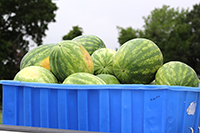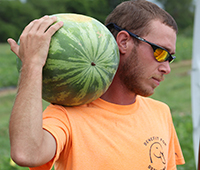In Georgia, it’s planting season for watermelons. Usually, they aspire to produce high yields of a sweet crop, but they shouldn’t ignore firmness and texture, according to Tim Coolong, University of Georgia Cooperative Extension vegetable horticulturist.
“Sweetness is a major component to watermelons, but without the right flesh firmness, the overall texture can be unpleasant,” Coolong said. “Consumers don’t like that.”
During statewide winter production meetings, Coolong discussed the previous year’s variety trial research, which focused on yield, sweetness and firmness. He classifies firmness in terms of consumers’ expectations. If the fruit is too soft, then the texture is poor and the fruit isn’t appealing to eat. If the fruit is too firm, then the consumer may consider it unripe.
“Watermelons are an important crop for our growers in southern Georgia. The market can fluctuate during the summer, so planting desirable watermelons is key to a productive season,” Coolong said. “One part of that success is having a melon with the firmness that consumers want. Based on my research, there are some watermelon varieties that consistently do this better than others and that’s what I wanted to convey to farmers this winter.”
To test for firmness, Coolong uses a penetrometer, a hand-held device with a probe 11 millimeters wide that registers resistance, measuring the firmness of the fruit when it’s pushed into the flesh. In order to generate comparable readings, Coolong and his crew must insert the probe at the same speed and in the same location in every melon.
Most melons land in the middle of the firmness scale, which means that they’re not too crisp or too soft.
Variety trial research is an important part of Coolong’s work at UGA. He tests between 25 and 30 varieties to get a good sample of what’s on the market.
“Certainly, we are only one part of a large effort that goes into bringing products and varieties to market for Georgia growers. We hope our research provides everyone with the best available information to make them more profitable,” he said.
In 2016, watermelon’s farm gate value in Georgia was estimated at 124.4 million, according to the UGA Center for Agribusiness and Economic Development.







.png)
